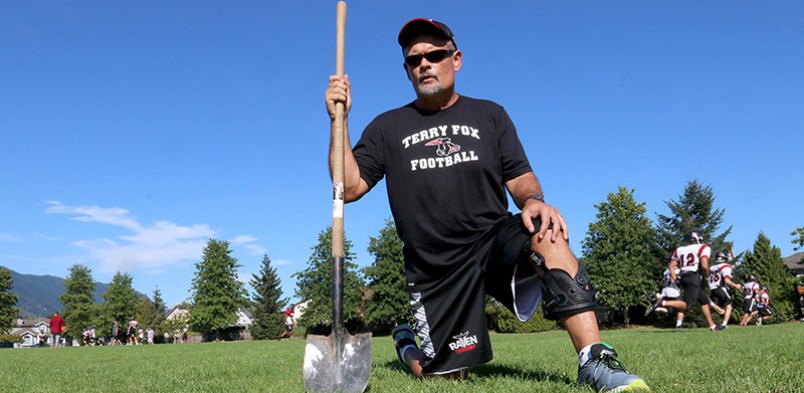Football coaches don’t like surprises.
They spend hours designing plays. They scout opponents, then drill their teams to anticipate their every move on both sides of the ball.
So when Terry Fox Ravens coach Martin McDonnell walks the field before practice and finds surprises, he’s not happy.
“It’s one of those things, it’s just an annoyance,” said McDonnell of the piles of dog poo he frequently has to clean up before his players hit the grass at the Port Coquitlam high school.
In fact, walking the field with a shovel in hand and keeping an eye out for doggy deposits and freshly dug holes has become a regular pre-practice routine for McDonnell.
The former is a health hazard, McDonnell said, noting, “Over the years, some of my students have had to miss school due to serious staph infections.”
The latter is a safety hazard, he said. “Students are at risk of sprained and broken ankles when running on uneven surfaces.”
While dogs other than assistance dogs are not allowed on School District 43 property between 8 a.m. and 5 p.m., McDonnell said he typically sees “10 to 20 people a day walking and throwing balls to their dogs on our school grounds and fields.”
All three municipalities in the Tri-Cities also have bylaws restricting off-leash dogs to designated off-leash dog parks, away from sports fields. Those fields also have signs reminding users of the rules, which are enforced by bylaw officers during regular patrols or when a complaint is filed.
City of Coquitlam spokesperson Kathleen Vincent said there have been 29 such complaints called in to the city’s bylaw enforcement line so far this year.
“The more frequent complaint is about dogs digging holes in the fields and being off leash during games or chasing our [lawn] mowers,” Vincent said.
Rosemary Lodge of the city of Port Moody said parks crews keep an eye out for hazards like potholes, litter and excrement during their twice-weekly maintenance visits to eight natural grass fields, two artificial turf fields and one all-weather field.
“Residents are asked to be responsible pet owners in our parks and clean up after their dogs,” Lodge said, adding not cleaning up their dog’s excrement can cost an owner $100 for a first offence to $300 for the third offence.
The city of Port Coquitlam also has bylaws that ban animals from running at large in its parks and requiring owners to clean up and dispose in appropriate receptacles any waste left behind by their animal. Fines for not cleaning up after a dog can be as high as $150.
Todd Gross, PoCo's city’s manager of parks and services, said crews also check sports fields daily during playing season and weekly when there are practices for safety and playability hazards like ruts, standing water, damage or vandalism.
Still, McDonnell said, scofflaws persist.
“School fields and playgrounds are not dog parks,” he said. “It’s frustrating.”



